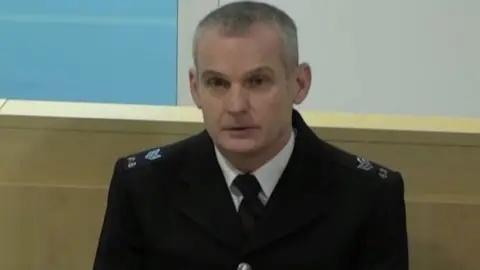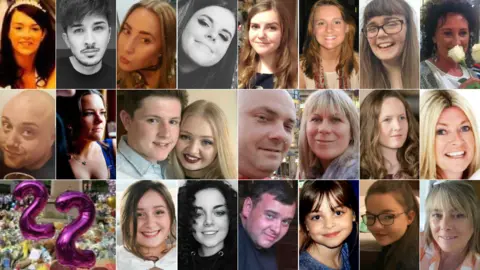Manchester Arena Inquiry: Officer faced with 'overwhelming chaos'
 Manchester Arena Inquiry
Manchester Arena InquiryA senior police officer has described the "overwhelming chaos" he faced in the wake of the 2017 Manchester attack.
Sgt Dave Cawley, of British Transport Police, told the inquiry into the bombing that his training did not prepare him for the scale of injuries.
Twenty-two people were killed and hundreds more injured in the attack.
Sgt Cawley said he tried to hand over command of the scene to a police firearms commander, who seemed in shock and simply stared straight ahead.
"Whilst I was trying to speak directly to him he was staring straight ahead not acknowledging what I was saying," he said.
"He didn't to me grasp the gravity of what I was saying."
The inquiry heard how Sgt Cawley was on duty on the night of the atrocity when he heard the explosion and was on the scene within a few minutes.
Bomber Salman Abedi had detonated a homemade device at the end of an Ariana Grande concert at Manchester Arena on 22 May that year.
 Family handouts
Family handoutsAs he ran through the a car park attached to the venue, he told how he came across an injured child.
He carried the girl to safety and arranged for a police vehicle to take her to hospital.
The inquiry heard when he returned, he went into Victoria Station at 22:45 GMT to find the trams were still running.
He provided his control room, based in Birmingham, with a situational awareness report - known as METHANE.
But Sgt Cawley did not enter the City Room - where the explosion had taken place - until sometime between 23:15 and 23:25 - at least 45 minutes after the explosion.
He said his training, which had been done online, did not prepare him for the type and scale of injuries, or the "overwhelming chaos" that ensued.
When he went into the City Room he saw a number of people dressed in green who he believed to be paramedics.
But the inquiry heard there were only three North West Ambulance Service paramedics in the room at the time, and a number of arena first aiders.
Sgt Cawley said his expectation was that the bringing together of information between the emergency services would be done by the command rooms, rather than by him on the ground.
He said he had known that in the event of a major incident, a shared radio channel would usually be set up between emergency services, but it was clear on the night this was not happening.
The inquiry earlier heard from the Fire Brigades Union, which said it would be no surprise if fire service failures after the attack were to happen again.
The inquiry continues.

Why not follow BBC North West on Facebook, Twitter and Instagram? You can also send story ideas to [email protected]
